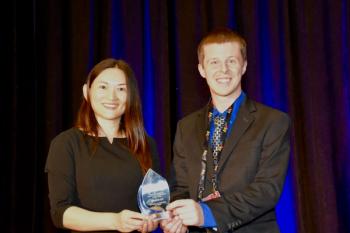
Spectroscopy Magazine Announces the 2021 Emerging Leader in Molecular Spectroscopy
Bhavya Sharma, PhD, an assistant professor of chemistry at the University of Tennessee, Knoxville, has won the 2021 Emerging Leader in Molecular Spectroscopy Award, which is presented by Spectroscopy magazine.
Bhavya Sharma, PhD, an assistant professor of chemistry at the University of Tennessee, Knoxville, has won the 2021 Emerging Leader in Molecular Spectroscopy Award, which is presented by Spectroscopy magazine. This annual award recognizes the achievements and aspirations of a talented young molecular spectroscopist, selected by an independent scientific committee. The award will be presented to Sharma at the SciX 2021 conference this fall, where she will give a plenary lecture and be honored in an award symposium.
Sharma received her PhD from the University of Pittsburgh in 2011. She has become a leader in the area of neurochemical detection with various forms of Raman spectroscopy, including surface-enhanced Raman spectroscopy (SERS) and spatially offset Raman spectroscopy (SORS). She has developed novel Raman spectroscopy methods for neurochemical detection, including surface-enhanced spatially offset Raman spectroscopy (SESORS). Her group has demonstrated detection of neurochemicals through the skull, down to nanomolar concentration ranges. Additionally, she is developing methods to demonstrate direct detection of molecules, such as cortisol, for the first time by combining SERS and multivariate analysis.
Sharma is a strong proponent of integrating under-represented minorities in undergraduate and graduate research. She has mentored 28 undergraduate students in research in 5.5 years, including 18 female students and 8 ethnic minorities. She has also mentored 6 female graduate students (out of 7 total). She teaches a one-month summer course for highly talented high school students titled “Introduction to Nanotechnology.” Approximately half of the ~70 students she has taught over the last 3 years are underrepresented minorities or will be first-generation college students.
Sharma has published 26 papers and given more than 40 oral and poster presentations at scientific conferences. She is a reviewer for multiple journals and received an Outstanding Reviewer award for the journal Analyst in 2018. She is also active with the Coblentz Society, serving on multiple award committees, and was a member of the program committee for the OSA Optical Sensors Conference for 2018–2019. She also has been active in organizing scientific sessions at various conferences, including Pittcon, the SPIE’s Defense + Commercial Sensing Symposium, and SciX.
For information about how to nominate a candidate for the 2022 award, please see the
Newsletter
Get essential updates on the latest spectroscopy technologies, regulatory standards, and best practices—subscribe today to Spectroscopy.




